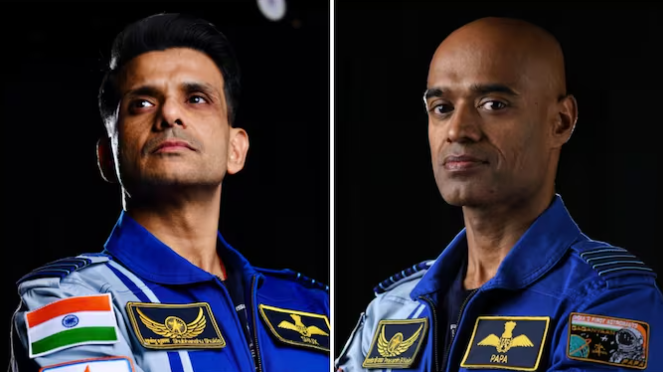Shubhanshu Shukla to Become Second Indian in Space: A Historic Axiom-4 Mission (GS Paper 3, Science & Technology)

Introduction
- India is poised to celebrate a historic achievement in space exploration as Group Captain Shubhanshu Shukla is set to become the second Indian astronaut to travel to space.
- Selected as the primary astronaut for the Axiom-4 mission, Shukla's upcoming journey represents a significant advancement in India’s space ambitions.
- This mission, a collaboration between Axiom Space and NASA, will use a SpaceX Crew Dragon spacecraft and underscores India's expanding role in the international space community.
Mission Overview
Axiom-4 Mission Details
- The Axiom-4 mission is slated to launch in 2024 and will be the fourth private spaceflight organized by Axiom Space in partnership with NASA.
- The mission will utilize a SpaceX Crew Dragon spacecraft, reflecting the increasing involvement of private companies in space exploration.
- Axiom-4 aims to continue the pioneering efforts of Axiom Space by establishing a sustainable human presence in low Earth orbit (LEO) and advancing commercial activities in space.
Objectives and Goals
The Axiom-4 mission has several key objectives:
- Commercial Space Endeavors: The mission aims to facilitate a variety of commercial activities, including scientific research and technological development, while also exploring opportunities for space tourism.
- International Collaboration: The mission will feature a diverse crew of astronauts from Poland, Hungary, and the United States, highlighting the global interest in space exploration and reinforcing international partnerships.
- Scientific Research: The mission will support a range of scientific experiments and technological tests in the unique microgravity environment of the ISS, with research focusing on materials science, biology, Earth observation, and more.
Shubhanshu Shukla: India’s Space Pioneer
Background and Career
- Group Captain Shubhanshu Shukla, born on October 10, 1985, in Lucknow, Uttar Pradesh, has been selected as the prime astronaut for the Axiom-4 mission.
- His selection marks a momentous achievement for India, as he will follow in the footsteps of Wing Commander Rakesh Sharma, who became the first Indian to travel to space during an Indo-Soviet mission in 1984.
- Shukla was commissioned into the Indian Air Force (IAF) on June 17, 2006.
- Over the years, he has amassed over 2,000 flying hours on various aircraft, including the Sukhoi-30 MKI and MiG-21.
- His career as a fighter combat test pilot has equipped him with the necessary skills and experience for spaceflight.
Inspiration and Training
- Shukla’s decision to join the space program was inspired by the bravery and resilience demonstrated during the Kargil War, which occurred when he was just 14 years old.
- His training for the Axiom-4 mission has been rigorous and extensive, including a significant period spent in Russia during the COVID-19 pandemic.
- This training has prepared him for the physical and technical demands of space travel and is a testament to his dedication and perseverance.
Backup Astronaut: Prasanth Balakrishnan Nair
Profile and Achievements
- Group Captain Prasanth Balakrishnan Nair, from Thiruvazhiyad, Kerala, has been appointed as the backup astronaut for the Axiom-4 mission.
- Nair, who joined the Indian Air Force in 1999, brings over 3,000 hours of flying experience to the mission.
- He has received the Sword of Honour and has held several key positions, including commanding a Sukhoi-30 squadron and serving as a Category-A flying instructor and test pilot.
Role in the Mission
- As the backup astronaut, Nair’s role is crucial in ensuring the mission’s success.
- He will be prepared to step in if needed, providing additional support and expertise to the mission team.
- His extensive background and training make him a valuable asset to the Axiom-4 mission.
Training and Preparation
Intensive Training Program
- Shukla and Nair will begin an intensive eight-week training program in August 2024.
- This training will encompass various aspects of space travel, including physical conditioning, technical skills, and mission-specific protocols.
- The training is designed to ensure that both astronauts are fully prepared for the complexities of space travel and can contribute effectively to the mission’s objectives.
Impact on Gaganyaan Mission
- The experience and knowledge gained from the Axiom-4 mission will significantly benefit India’s upcoming Gaganyaan mission, which is scheduled for next year.
- The insights from this mission will help refine India’s space program, enhancing its capabilities in human spaceflight and contributing to the success of future missions.
Impact on India’s Space Program
Strengthening India’s Space Capabilities
- The Axiom-4 mission represents a major milestone for India’s space program, showcasing the nation’s growing capabilities in space exploration.
- ISRO Chairman Somanath has highlighted the mutual benefits of the Indo-US collaboration, emphasizing how the mission will provide advanced training and insights that will support the Gaganyaan project.
Global Space Community Involvement
- India’s participation in the Axiom-4 mission underscores its expanding role in the global space community.
- The mission highlights India’s commitment to advancing space exploration and strengthening international partnerships, reflecting the country’s increasing influence and ambition in the field.
Conclusion
- Group Captain Shubhanshu Shukla’s selection as the primary astronaut for the Axiom-4 mission marks a historic achievement for India.
- His upcoming journey, alongside a diverse international crew, reflects India’s progress and growing influence in space exploration.
- The mission’s focus on commercial space activities, international collaboration, and scientific research will advance India’s space capabilities and contribute to the broader goals of global space exploration.
- With this milestone, India continues to build on its space legacy, paving the way for future exploration and technological innovation.


